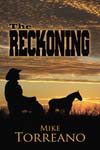 Relevant History welcomes Mike Torreano, who has a military background and is a student of the American West. He fell in love with Zane Grey’s novels in the fifth grade. He has taught University English and Journalism and is a member of The Historical Novel Society and Western Writers of America. He brings his readers back in time as he recreates western life in the late nineteenth century. For more information about him and his books, visit his web site, and follow him on Facebook.
Relevant History welcomes Mike Torreano, who has a military background and is a student of the American West. He fell in love with Zane Grey’s novels in the fifth grade. He has taught University English and Journalism and is a member of The Historical Novel Society and Western Writers of America. He brings his readers back in time as he recreates western life in the late nineteenth century. For more information about him and his books, visit his web site, and follow him on Facebook.
*****
 My western mystery, The Reckoning, was released last year by The Wild Rose Press. It’s set in 1868 and follows Ike McAlister, a Union soldier who returns from the Civil War to his hometown of Lawrence, Kansas to find his parents have been killed by Quantrill’s raiders. He sets out on a single-minded hunt to find the murderers, a search which takes him to the high plains of Colorado.
My western mystery, The Reckoning, was released last year by The Wild Rose Press. It’s set in 1868 and follows Ike McAlister, a Union soldier who returns from the Civil War to his hometown of Lawrence, Kansas to find his parents have been killed by Quantrill’s raiders. He sets out on a single-minded hunt to find the murderers, a search which takes him to the high plains of Colorado.
I’ve heard some people say the traditional American western is dead—all of which prompts the question, ‘If that’s so, why write a western?’ Well, it’s true the golden age of westerns was some time back. Since then, there’s been a bit of a dry spell until recently when several big box office westerns have been released.
Are they’re coming back? I don’t know, but I hope so. Why would they be mounting a return? Perhaps because westerns and the Old West embody timeless values, places where right triumphs over wrong. Not always, certainly, but you get the idea. The American West in the nineteenth century was a black and white society with clear-cut rules—there were things you were supposed to do as well as things you weren’t. And if you did wrong, there were consequences, oftentimes immediate.
Code of the West
There was a code of the West, even among the bad guys. Simple rules for simpler times. Unwritten, but adhered to nonetheless. The Code drew its strength from the underlying character of westerners, both men and women alike. Life back then was hard, but it was also simple. Things that needed to get done got done. Whining wasn’t tolerated. Complainers were ignored. You weren’t a victim; you just played the hand you were dealt.
If you’re getting the idea I like that kind of culture, I guess you’re right.
The world we live in today sometimes baffles me. Everything seems to be different shades of gray. Honor and fidelity seem to be out of fashion. Our culture is filled with victims. People are entitled. The media are advocates, not observers.
While the Code of the West was unwritten and existed in various forms, there were certain common elements everyone—from the hard-working sodbuster, to the law-abiding citizen, to the hardened criminal—typically abided by. Granted, there were exceptions, but generally that held true.
In 2004, Jim Owens synthesized the Code into ten guiding principles in his book, Cowboy Ethics-What Wall Street Can Learn from the Code of the West.
- 1. Live each day with courage.
- 2. Take pride in your work.
- 3. Always finish what you start.
- 4. Do what has to be done.
- 5. Be tough, but fair.
- 6. Keep your promises.
- 7. Ride for the brand.
- 8. Talk less and say more.
- 9. Some things aren’t for sale.
- 10. Know where to draw the line.
Let’s look at three of these.
How about number seven—Ride for the brand. It means be loyal to the people in your life—from family and friends, to those you work for. It’s the idea when you’re involved with someone, you should be loyal to them.
Take a look at number four—Do what has to be done. Life is oftentimes messy. Our days are filled with ups and downs, and we make choices all the time. This is about choosing to get done what has to be done, then getting on with something else.
Next, there’s number nine—Some things aren’t for sale. The Code gave westerners a guide to live by that they broke at their own peril. Are there still things today that aren’t for sale? What are they for you? They might be different for each of us, but at the end of the day I’d wager we all still have values that are non-negotiable. After all, values don’t really change—only times, circumstances, and people do. So, if that’s true, then nineteenth century America is still relevant to today’s America.
Out where the West begins
 The good news is the values the Code embodied haven’t vanished, but more often than not they seem to have been marginalized. Popular culture tends to look down on old-time values, or should I say the timeless values of nineteenth century America. We’re an instant gratification society that focuses on the here and now, and too often disregards the lessons of the past. Imagine a world where you sat with your family for dinner at night, sometimes even talking with each other. A novel concept. Imagine a world where a man’s word, and a woman’s, was their bond. Where handshakes took the place of fifty-page contracts. These principles were captured by Arthur Chapman in “Out Where the West Begins,” a poem he wrote in 1917.
The good news is the values the Code embodied haven’t vanished, but more often than not they seem to have been marginalized. Popular culture tends to look down on old-time values, or should I say the timeless values of nineteenth century America. We’re an instant gratification society that focuses on the here and now, and too often disregards the lessons of the past. Imagine a world where you sat with your family for dinner at night, sometimes even talking with each other. A novel concept. Imagine a world where a man’s word, and a woman’s, was their bond. Where handshakes took the place of fifty-page contracts. These principles were captured by Arthur Chapman in “Out Where the West Begins,” a poem he wrote in 1917.
Where there’s more of singing and less of sighing,
Where there’s more of giving and less of buying,
And a man makes friends without half trying—
That where the West begins.
So, yes, occasionally I yearn for those simpler times amid the hustle and bustle of our world. We’re inundated with various media from morning to night. Sometimes Ike’s and Lorraine’s, my main characters, simple, straightforward lives look pretty appealing. Especially now.
Westerns serve to remind us of our solid roots, and that’s why they will never die.
*****
 A big thanks to Mike Torreano. He’ll give away a trade paperback copy of The Reckoning to someone who contributes a comment on my blog this week. I’ll choose the winner from among those who comment by Friday at 6 p.m. ET. Delivery is available in the U.S. only.
A big thanks to Mike Torreano. He’ll give away a trade paperback copy of The Reckoning to someone who contributes a comment on my blog this week. I’ll choose the winner from among those who comment by Friday at 6 p.m. ET. Delivery is available in the U.S. only.
**********
Did you like what you read? Learn about downloads, discounts, and special offers from Relevant History authors and Suzanne Adair. Subscribe to Suzanne’s free newsletter.
